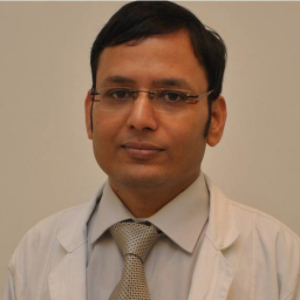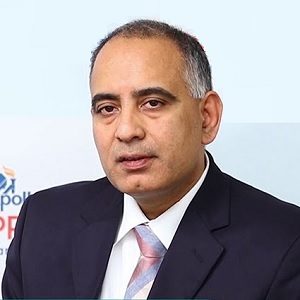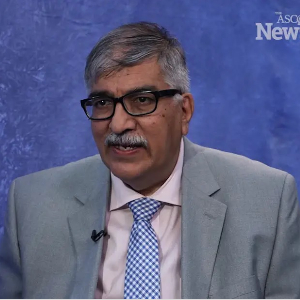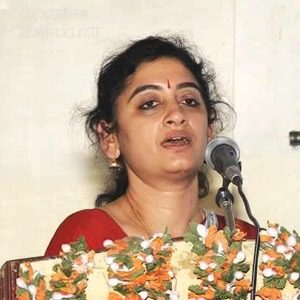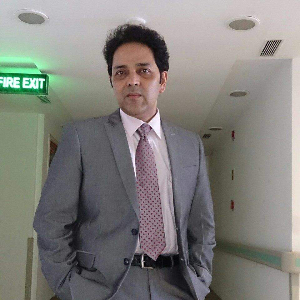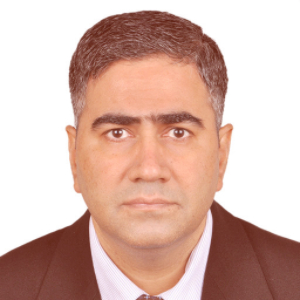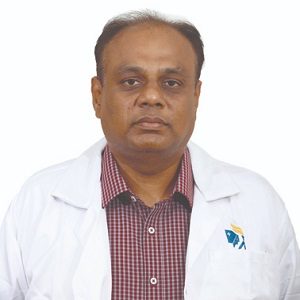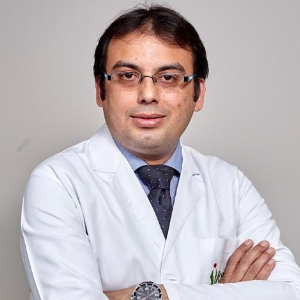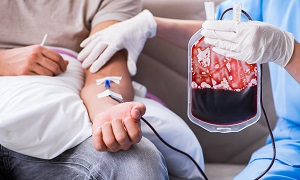Best Doctors in India for Sickle Cell Anemia treatment
- Hematologist, Gurugram, India
- Over 17 years’ experience
Profile Highlights:
- Dr. Rahul Naithani is a reputed clinical hematologist. After his return from Canada, Dr. Naithani started his Hematology and Bone Marrow Transplant program at Max healthcare and is known to have performed over 130 BMTs in the past. Currently, he is the Director of Bone Marrow Transplant in Paras Hospital.
- His incredible skills and proficient work experience are currently helping him indulge in scientific research with multiple publications to his credit helping the national and international medical industry greatly.
- Medical Oncologist and BMT Specialist, Chennai, India
- Over 25 years’ experience
Profile Highlights:
- Dr. T. Raja is a Medical Oncologist from the Tamil Nadu state with 25 years of know-how in this field.
- He has proficiency in Cancer Screening, Chemotherapy, PICC Line Insertion, Bone Marrow Transplantation, Stem Cell Transplantation, Pap collection, lymphoma, Renal Cell Cancer management, and Head and Neck Tumor.
- Dr. Raja was the Principal Investigator for several clinical studies, a published author for journals, and a teacher.
- Director and Head Medical Oncology/Hematology, Gurugram, India
- Over 40 years’ experience
Profile Highlights:
- Dr. Rakesh Chopra is a well-known Medical Oncologist with national and international repute as one of the best in the treatment of all types of blood cancers including leukemia, lymphoma, multiple myeloma, and bone marrow transplant.
- His specialization lies in blood cancer and also provides treatment for solid cancers of the breasts, lungs, prostate, colon, and GI.
- Paediatric Hematologist, Chennai, India
- Over 24 years’ experience
Profile Highlights:
- As a hematologist, Dr. Revathi Raj has been practicing successfully for over 24 years.
- She provides treatments for thalassemia, eosinophilia, male and female health screening, and biochemistry.
- Dr. Revathi is a member of the Indian Medical Association (IMA).
- Hematologist and Pediatric Oncologist, Mumbai, India
- Over 30 years’ experience
Profile Highlights:
- Dr. Santanu Sen is among the top-rated pediatric oncologists in India and is highly skilled in the treatment of brain, blood, bone cancer, and other types of blood disorders in children.
- Dr. Sen has been associated with one of the renowned cancer hospitals in the world, the Royal Marsden Hospital in London.
- He is currently associated as a Consultant with Kokilaben Dhirubhai Ambani Hospital in Mumbai where he also heads the Pediatric Stem Cell Transplant Program. This program holds the credit for performing Stem Cell Transplants on the youngest baby in the world (4 months for Neuroblastoma) as well as the youngest Thalassemia transplant in India (9-month-old baby).
- Pediatric Hemato Oncologist, Gurugram, India
- Over 20 years’ experience
Profile Highlights:
- Dr. Satya Prakash Yadav is counted among the most experienced pediatric hemato-oncologists in India. His primary focus lies in Pediatric Leukemia, Bone Marrow, and Stem Cell transplantation.
- His experience exceeds over 20 years during which he has performed more than 400 bone marrow and blood transplant procedures. Among these, he has also performed over 50 Haplo identical bone marrow transplants and 50 unrelated donor and cord transplants.
- Dr. Yadav specializes in Blood Cancer treatment, Bone Marrow Transplant, Medical Oncology, and Stem Cell Transplant and has performed several such procedures with successful results.
- Hemato Oncologist & BMT Specialist, New Delhi, India
- Over 10 years’ experience
Profile Highlights:
- Dr. Shishir Seth is a Hemato Oncologist and Bone Marrow Transplant specialist currently practicing at Indraprastha Apollo Hospital, New Delhi
- He has performed over 200 hematopoietic stem cell transplants successfully of which 40 included allogenic haploidentical transplants and antigen mismatch transplants. He has also performed 300 induction therapies for acute leukemia.
- Dr. Shishir Seth is an expert hematologist and hemato oncologist with an interest in the management and treatment of different blood diseases (benign and malignant).
- With an experience of 10+ years in Hematology and BMT, Dr. Seth has achieved several feats in his career that have gained him immense popularity and recognition.
- Dr. Shishir Seth is involved with research work as well and has numerous publications in his name in national and international journals.
- Hematologist, Chennai, India
- Over 25 years’ experience
Profile Highlights:
- Dr. Srikanth M is one of the top Hematologists in Chennai with an experience of 25 years in the field.
- He assists patients with an accurate diagnosis, consultation, and treatment for Hemophilia, Leukemia, Myeloma, Thalassemia, Lymphoma, and other blood diseases. The doctor also offers Bone Marrow Transplant and Chelation Therapy, etc.
- Dr. Srikanth M has completed MRCP from the Royal College of Physicians, London to enhance his skills and received a fellowship from Royal Marsden Hospital.
- Pediatric Hemato Oncologist & BMT Surgeon, Gurugram, India
- Over 20 years’ experience
Profile Highlights:
- Dr. Vikas Dua is one of the best Pediatric Hemato Oncologist and Bone Marrow Transplant surgeons in India with over 200 pediatric Bone Marrow Transplants to his credit.
- His specialty lies in Pediatric haploidentical transplants and also finds interest in Bone Marrow Transplants for Leukemia and Thalassemia in pediatric patients.
- Dr. Vikas Dua received his training in Pediatric BMT from St. Jude Children’s Research Hospital in Memphis and holds Fellowship in Pediatric BMT from the National University Hospital in Singapore.
Best Hospitals in India for Sickle Cell Anemia treatment
Rela Hospital, Chennai
- City: Chennai, India
Hospital Highlights:
- RIMC is a multi-specialty hospital in a sprawling area of 36 acres located in Chromepet, Chennai, Tamil Nadu, India.
- The facility has 450 beds including 130 critical care beds, 9 operating rooms, modern reference laboratories and radiology services, and is conveniently located near road, rail and air transportation.
- RIMC is led and managed by world-renowned physicians committed to healthcare.
- RIMC offers the broadest range of clinical care, education, and research. The hospital offers state-of-the-art technology and modern treatment facilities designed to provide health care at an affordable cost.
- Rela Institute is driven by patient needs, comfort and confidence.
CARE Hospitals, Hyderabad
- City: Hyderabad, India
Hospital Highlights:
- CARE Hospitals were established in the year 2000, by CARE Group.
- The multispecialty hospital has 435 beds, including 120 critical care beds, with an annual inflow of 180000 outpatients and 16,000 in-patients.
- The hospital provides specialty medical services in Cardiology, Cardiothoracic Surgery, Pediatric Cardiology, Pediatric Cardiothoracic Surgery, Neurology, Neurosurgery, Nephrology, and Urology.
- The hospital has the first dual source, 128 slice CT scanner (for high precision cardiac imaging) – the first of its kind in south India.
- The hospital offers a wide range of accommodation facilities for the convenience of its varied patient base, ranging from general wards to super deluxe rooms.
Fortis Hiranandani Hospital, Mumbai
- City: Mumbai, India
Hospital Highlights:
- Fortis Hiranandani hospital was established in 2007.
- The hospital is an advanced tertiary care, multi-specialty hospital equipped with 149 beds.
- The hospital is equipped with a super ICU to provide emergency medical care to critically ill patients.
- The hospital is NABH accredited.
- The critical care facility in the hospital is augmented with the state-of-the-art facilities that facilitate speedier diagnosis and efficient monitoring.
- The hospital provides specialty medical services in cardiology, orthopedic science, pediatric science, neurology, diabetic care, urology, nephrology, ENT, obstetrics, gynecology, cosmetic surgery, bariatric surgery, neuro and spine care.
Fortis Hospital, Anandpur, Kolkata
- City: Kolkata, India
Hospital Highlights:
- Fortis Hospital, Anandapur, Kolkata is a world-class super-speciality equipped with the latest technologies in the medical world.
- The hospital is NABH accredited.
- This state-of-the-art facility specializes in cardiology and cardiac surgery, urology, nephrology, neurosciences, orthopaedics, digestive care, emergency care and critical care.
- The hospital, governed by integrated Building Management System (IBMS), has a pneumatic chute system, for quick vertical and horizontal transportation between floors, facilitating speedy transfer of patient specimens, documents, reports, and medicines to the concerned departments.
- The hospital also has a nephrology department with over 28 advanced dialysis units.
Fortis Hospital, Malar, Chennai
- City: Chennai, India
Hospital Highlights:
- Fortis Malar was established in 1992 and was formerly known as Malar Hospital.
- The hospital specializes in cutting-edge medical technology and dedicated patient care services.
- The hospital is multi-specialty, tertiary care facility with 180 beds.
- The hospital offers comprehensive medical care in specialties such as cardiology, cardio-thoracic surgery, neurology, neurosurgery, orthopedics, nephrology, gynecology, gastroenterology, urology, pediatrics, and diabetes.
Gleneagles Global Hospital, Parel, Mumbai
- City: Mumbai, India
Hospital Highlights:
- Gleneagles Global Hospital The 450-bed facility comprises of 17-stories, housing state-of-the-art infrastructure, and advanced medical care facilities.
- The hospital offers end-to-end clinical, surgical, and diagnostic services. It is equipped with a team of eminent medical professionals aided by qualified nurses and medical staff
- The Hospital offers advanced Endoscopic procedures, Hepatobiliary and Liver Surgeries, Surgical and Medical Gastroenterology, Bariatric Surgery, and Robotic surgery.
- The hospital is a center of excellence for Orthopedics, Joint Replacement, Knee Replacement, and Hip Replacement surgery.
Jaypee Hospital, Noida
- City: Noida, India
Hospital Highlights:
- Jaypee Hospital is the flagship hospital of the Jaypee Group.
- This hospital has commissioned 525 beds in the first phase and has been planned and designed as a 1200 bedded multi-specialty facility.
- It holds the accreditation of the NABH and NABL.
- The hospital has state-of-the-art infrastructure equipped with the latest technologies and modern equipment like 64 Slice PET CT, Dual Head 6 Slice SPECT CT, Gamma Camera, and Da Vinci Robotic Surgery for comprehensive robotic surgical solutions.
- It has special Centers dedicated to the major specialties to provide hassle-free and high-quality clinical care.
S L Raheja Hospital, Mahim, Mumbai
- City: Mumbai, India
Hospital Highlights:
- SL Raheja hospital is a 140-bed multi-specialty tertiary care hospital that is being managed by Fortis Healthcare Ltd.
- The hospital is a benchmark in healthcare and medical facilities in the neighborhood of Mahim & the western suburbs.
- L.Raheja Hospital, Mahim has one of the most effective ICU and Casualty care services.
- The hospital provides specialty medical services in Cardiology, Oncology, Neurology, Orthopedics, Mother & Child Care, and in Diabetes.
Narayana Superspeciality Hospital, Gurugram
- City: Gurugram, India
Hospital Highlights:
- Situated near DLF Cyber City, Gurugram, Narayana Superspecialty Hospital is one of the top medical facilities in the Delhi NCR region, catering to the needs of the people. Known for its commitment to quality medical care and patient service, the hospital is a state-of-the-art facility with planned and well-equipped sections, which includes a spacious OPD area as well as comfortable patient rooms.
- It is the closest super-specialty hospital from Indira Gandhi International Airport towards Gurugram, and also the nearest super specialty hospital from DLF Cyber City. It is also close to major residential areas in Gurugram.
- It is part of the renowned Narayana Health Group. Established in 2000, by Dr. Devi Shetty, a renowned cardiac surgeon, it has grown to be one fo India’s leading healthcare groups.
Sir Ganga Ram Hospital, New Delhi
- City: New Delhi, India
Hospital Highlights:
- Sir Ganga Ram Hospital, New Delhi is known to provide the latest medical procedures with the latest technology in all of its units.
- The hospital has a team of reputed doctors, nurses, and healthcare professionals that ensure that patients receive quality care at affordable costs.
- Staffed with a team of highly qualified doctors, dedicated nurses, and paramedical and non-medical staff, the hospital aims to lead in healthcare delivery, medical education, training, and research.
- As per the vision of the founder, the hospital also provides free treatment to the economically weaker sections of society.
- Sir Ganga Ram Hospital also provides training to young doctors under the Diplomate in National Board(DNB) program. The DNB program at the hospital was started in 1984 and it is known for currently running the maximum number of DNB specialties in the country. It also has the distinction of having the first bone bank in India.
Sickle Cell Anemia
Sickle cell anemia is an inherited blood disorder. People suffering from this disease don’t have adequate healthy red blood cells that can carry oxygen throughout their bodies. The red blood cells are flexible and disc-shaped. Normally, they can easily move through the blood vessels. However, in Sickle Cell Anemia, the red blood cells acquire the shape of a sickle or a crescent moon. The cells become sticky and rigid. Ultimately, they are not able to pass through the small blood vessels. This blocks or slows down oxygen and blood flow to various parts of your body.
Sickle cell anemia is an autosomal recessive disease and you will have two copies of the genes if you are suffering from this disease. The cells trapped in the blood vessels can cause tissue damage and pain. You can only inherit the disease from your family and you will have the disease by birth. You cannot acquire the disease later in life due to external factors. The other names for the disease are Hemoglobin S disease, sickle cell disorders, HbS disease and sickle cell disease.
Types of Sickle Cell Anemia
Hemoglobin carries oxygen in the red blood cells. Different mutations in the genes cause four different types of Sickle Cell Anemia.
Hemoglobin SS disease: Considered the most common type of Sickle Cell Anemia, it occurs if you inherit copies of the hemoglobin S gene from your mother as well as father. This leads to the formation of the Hb SS. It is the most severe type of SCD and you may experience symptoms at a high rate.
Hemoglobin SC disease: As a less severe type of anemia, it is the second most common form of SCD. When you inherit the Hb C gene from one of your parents & the HbS gene from the other parent, you will suffer from this type.
Hemoglobin SB+ (Beta) Thalassemia: It affects the production of the beta-globin gene. With less production of beta protein, the size of the red blood cells reduces. You will suffer from hemoglobin S beta thalassemia if you inherit the Hb S gene.
Hemoglobin SB 0 (Beta-zero) Thalassemia: It is another type of Sickle Cell Anemia that involves the beta-globin gene. You may experience some severe symptoms if you are suffering from this disease.
Causes of Sickle Cell Anemia
A defect in the hemoglobin-beta gene present on chromosome 11 causes sickle cell disease. Due to the defect, abnormal hemoglobin is formed. You will have the disease if both your parents pass on the abnormal hemoglobin gene to you. If you have only one defective hemoglobin-beta gene, you are a carrier of the disorder. You won’t experience the symptoms of Sickle Cell Anemia but you can pass the disease to your children if your husband or wife is also a carrier of the trait.
Symptoms of Sickle Cell Anemia
The first signs of Sickle Cell Anemia appear when the child is 5 months old. The symptoms of SCD include:
- Anemia- You will have very few red blood cells when the sickle cells break easily and die. While the red blood cells normally live for 120 days before their death, the sickle cells hardly live for 20 days. This causes anemia or a shortage of red blood cells. Because of this, your body won’t get adequate oxygen and cause fatigue.
- Pain- You will also experience episodic pain when the sickle-shaped cells obstruct the blood flow through the blood vessels. The intensity of the pain will vary and it may sometimes last for a few weeks.
- Swelling- The sickle-shaped cells block blood flow to the various parts of your body and cause swelling.
- Infections- You may be at a higher risk of infections when sickle cells cause damage to your so spleen.
- Delayed growth- Your body gets the required nutrients and oxygen for the growth from the red blood cells. Sickle-shaped cells slow down the growth of your body.
- Vision problems- The sickle cells may get stuck into the blood vessels that supply your eyes. This can cause damage to the portion of your eyes that produces visual images- the retina. Ultimately, you will suffer from vision problems.
Diagnosis of Sickle Cell Anemia
Treatment Options for Sickle Cell Anemia
Medications
Preventing infections
Blood transfusions
Stem cell transplant
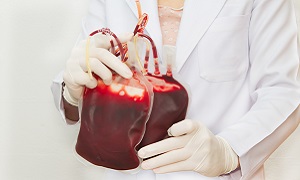
Healthy diet
Avoiding extreme temperatures
Talking


